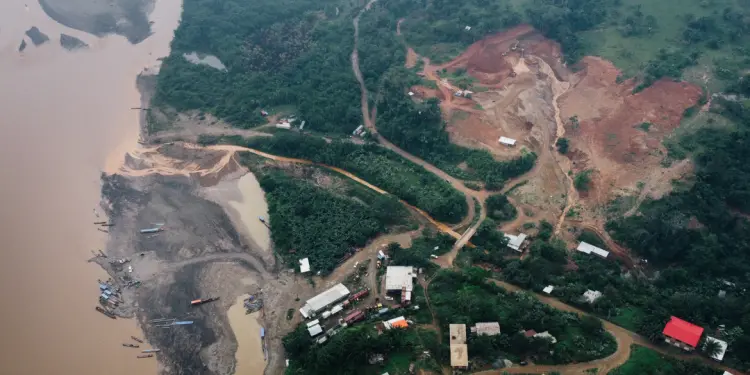This story excerpt was translated from Spanish. To read the original story in full, visit El Diario. You may also view the original story on the Rainforest Journalism Fund website here. Our website is available in English, Spanish, bahasa Indonesia, French, and Portuguese.

The first thing we hear when we wake up is the scandalous noise of stones hitting a metal plate. It doesn't matter that we are more than 200 meters away from the operation site, the roar overshadows the birds singing and the calm advance of the river.
It is still dark, 5:50am. The engines of the dump trucks roar as they line up to pick up the removed sand and carry it to the top of an artificial hill. They deposit it so that a backhoe can place it in this machine where the stones fall on carpets with thick plastic bristles where they say that the gold remains, little by little.
The work in the mining camps in Mayaya, a community in the Amazonian forest north of La Paz, never stops, or almost never. Thousands of workers work 11-hour shifts in gigantic areas of barren, contaminated, desert-like soil, which breaks through like a disease. From here, the Kaka River is poisoned, whose waters, kilometers downstream and together with other streams, kiss the banks of the Madidi National Park.
The miners work for Chinese entrepreneurs. An illegal association between Bolivian cooperatives and foreign investors (mostly from the Asian giant) have made this devastation a reality with the complicity of the Bolivian State. Gold mining has destroyed nature in these populations, and the impact reaches Madidi, one of the most important areas in the world in terms of biodiversity. Every day, every hour, thousands of liters of water containing mercury and other pollutants stain the rivers that flow into this protected area.

As a nonprofit journalism organization, we depend on your support to fund journalism covering underreported issues around the world. Donate any amount today to become a Pulitzer Center Champion and receive exclusive benefits!
- View this story on Infobae










